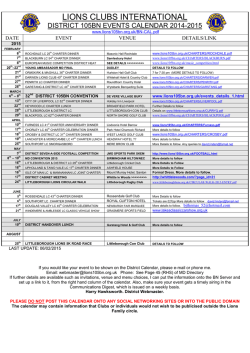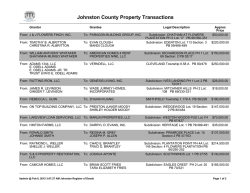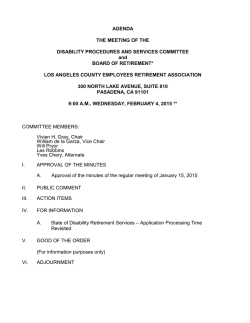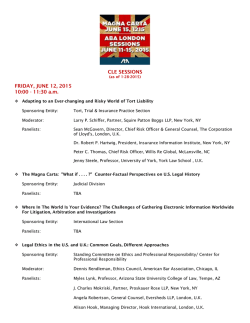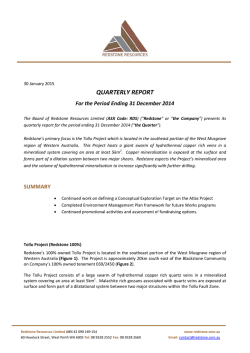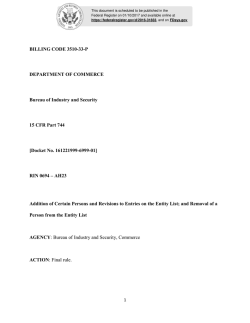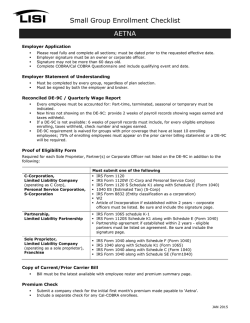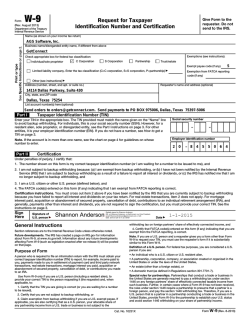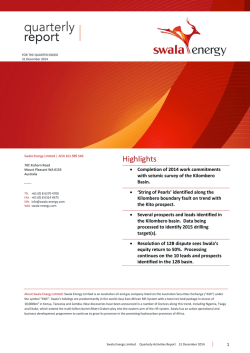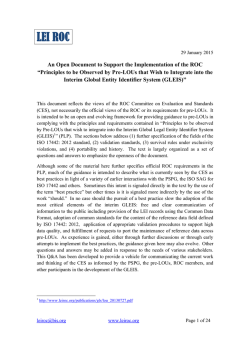
View the Memo - Groom Law Group
February 2, 2015 Author: David W. Powell If you ha ve questions, please conta ct your regular Groom a ttorney or one of the a ttorneys l i sted below: IRS Announces Guidance and Transition Relief for Charter Schools in Public Plans Elizabeth T. Dold [email protected] (202) 861-5406 Background Ian D. Lanoff i l [email protected] (202) 861-6638 David N. Levine dl [email protected] (202) 861-5436 Louis T. Mazawey l ma [email protected] (202) 861-6608 David W. Powell [email protected] (202) 861-6600 William F. Sweetnam, Jr. ws [email protected] (202) 861-5427 Ever since the IRS issued its Advance Notice of Proposed Rulemaking (ANPRM), relating to the definition of a governmental plan under § 414(d) of the Code, in late 2011 (76 FR 69172), one of many questions raised by the ANPRM has been whether charter schools may participate in governmental plans. Charter schools often have some, but not all, of the governmental characteristics of traditional public schools, and often participate in state or local retirement systems. Before the ANPRM was issued, some state charter schools had obtained private letter rulings on their specific situations, but every state had different arrangements for charter schools, and some have been concerned that the final regulations might make it more difficult for charter schools to participate in state or local retirement systems. The IRS received over 2000 comments on various aspects of the ANPRM, many of which concerned charter schools. In response to requests for clarification, the IRS has now issued Notice 2015-07 (Jan. 23, 2015), which announces what positions IRS is considering with respect to charter schools under the regulations, and transition relief prior to the effective date of the final regulations. Impact of the Guidance and Transition Relief It is believed that many charter schools that currently participate in state or local retirement systems already meet the requirements under consideration, which are described in detail below, so if these continue to be the requirements into the final rule, many charter schools may breathe a sigh of relief. Undoubtedly, many schools and retirement systems are studying these criteria closely and will comment on them. However, while the IRS indicates that it is considering this rule, of course, the rule may change by the time it is proposed or made final in the final regulations. Significantly, the IRS and Treasury Department also issued as a part of the notice important transition relief indicating they anticipate that the final regulations under § 414(d) will provide that a State or local retirement system that covers employees of a public charter school that meets the requirements of the guidance under consideration described above for periods starting on and after the effective date of the final regulations will not fail to be a governmental plan within the meaning of § 414(d), even if the plan covered those employees for periods before the effective date of the final regulations when the public charter school did not meet the requirements of the guidance under consideration described above. In other words, charter schools will have until the effective date of the final regulations to make any changes needed to meet the requirements of the final regulations, whatever those will be. Broader Transition Relief and Comments Comments on the charter school guidance, including whether the requirements of the guidance under consideration are sufficient to limit the guidance to participation of employees of public charter schools in a State or local retirement system and, for example, to not cover participation of employees of entities that provide management or other services to public charter schools, are requested by May 11, 2015. Beyond charter schools, the IRS and Treasury Department also indicated they expect questions regarding broader transition relief, such as grandfather rules, a de minimis rule, and the impact of contractual protections, to be addressed when the proposed regulations are issued. Specific Guidance Under Consideration The IRS and Treasury Department state in the Notice that they are considering proposing regulations under § 414(d) specifying that a State or local retirement system that covers employees of a public charter school will not fail to be a governmental plan merely because the system permits employees of an entity that satisfies the requirements listed in paragraphs (a) through (e) below to participate in the system: (a) The entity is a nonsectarian independent public school that serves a governmenta l purpose by providing tuitionfree elementary or secondary education, or both. (b) The entity is established and operated in accordance with a specific State statute authorizing the granting of charters to create independent public schools or authorizing the establishment of independent public schools. (c) Participation in the State or local retirement system by the entity’s employees is expressly required or permitted under applicable law. (d) The entity satisfies either paragraph (d)(1) or (d)(2) below. (1) The entity’s governing board or body is controlled by a State, political subdivision of a State, or agency or instrumentality of a State or of a political subdivision of a State. For this purpose, either (i) a State, political subdivision of a State, or an agency or instrumentality of a State or political subdivision of a State must have the power to nominate, appoint, remove, and replace a majority of the members of the entity’s governing board or body, or (ii) a majority of the members of the entity’s governing board or body must be publicly nominated and elected. (2) In lieu of satisfying the requirements in paragraph (d)(1), the entity satisfies the requirements in paragraphs (d)(2)(i) through (d)(2)(iii) below. (i) The primary source of the entity’s funding is from a State, political subdivision of a State, or agency or instrumentality of a State or political subdivision of a State. (ii) The rights of the entity’s employees to their accrued benefits under the State or local retirement system are not dependent on whether the entity continues to participate in the system and, in the event the entity ceases participation, a governmental entity has responsibility for the accrued benefits of the 2 This publication is provided for educational and informational purposes only and does not contain legal advice. The informati on should in no way be taken as an indication of future legal results. Accordingly, you should not act on any information provided without consulting legal counsel. To comply with U.S. Treasury Regulations, we also inform you that, unless expressly stated otherwise, any tax advice contained in this communication is not intended to be used and cannot be used by any taxpaye r to avoid penalties under the Internal Revenue Code, and such advice cannot be quoted or referenced to promote or market to another party any transaction or matter addressed in this commu nication. © 2015 Groom Law Group, Chartered • 1701 Pennsylvania Ave NW • Washington, DC 20006. All rights reserved. entity’s employees, including the continued funding of the accrued benefits, to no lesser extent than a governmental entity has responsibility for the continued funding of the accrued benefits of the employees of any other participating employer in the system in the event that other employer were to cease to be a participating employer. (iii) The entity is part of a local educational agency, as defined in 20 U.S.C. § 7801(26) (or is its own local educational agency), and is subject to the significant regulatory control and oversight by a State, political subdivision of a State, or agency or instrumentality of a State or political subdivision of a State, as described in paragraphs (d)(2)(iii)(1) and (d)(2)(iii)(2) below. (1) The entity is held accountable by an authorized public chartering agency as defined in 20 U.S.C. § 7221i(4), which has the power to approve, renew, and revoke the charter of the entity. For this purpose, the authorized public chartering agency must be authorized under State law to approve charters for the creation of independent public schools and to hold the entity accountable fo r results. (2) The entity is required to comply with health and safety standards, as well as academic and financial accountability standards, that are similar to those that are generally applicable to other public schools in the State. (e) All financial interests of ownership in the entity are held by a State, political subdivision of a State, or agency or instrumentality of a State or of a political subdivision of a State. A State, political subdivision of a State, or agency or instrumentality of a State or political subdivision of a State is not treated as holding all financial ownership interests in an entity unless, upon dissolution or final liquidation of the entity, the entity’s governing documents require the entity’s net assets to be distributed to another public or charter school that meets the requirements in (a) through (e) above or to a State, political subdivision of a State, or agency or instrumentality thereof. 3 This publication is provided for educational and informational purposes only and does not contain legal advice. The informati on should in no way be taken as an indication of future legal results. Accordingly, you should not act on any information provided without consulting legal counsel. To comply with U.S. Treasury Regulations, we also inform you that, unless expressly stated otherwise, any tax advice contained in this communication is not intended to be used and cannot be used by any taxpaye r to avoid penalties under the Internal Revenue Code, and such advice cannot be quoted or referenced to promote or market to another party any transaction or matter addressed in this commu nication. © 2015 Groom Law Group, Chartered • 1701 Pennsylvania Ave NW • Washington, DC 20006. All rights reserved.
© Copyright 2026
